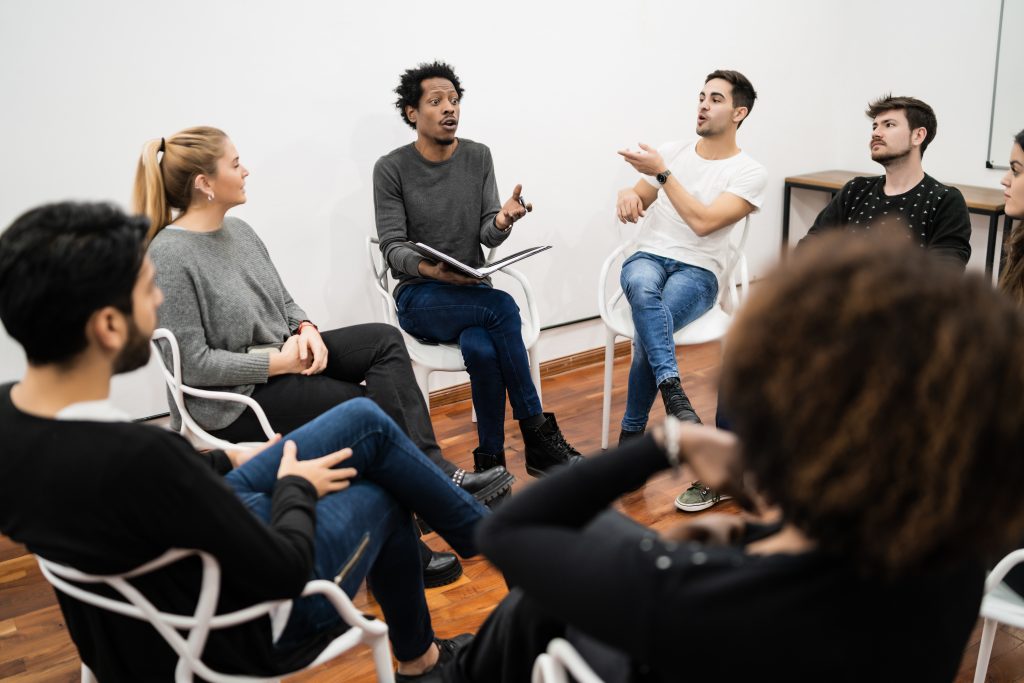Learning Library
Additional Activities
Peer-to-Peer Activity: Storytelling
Overview
Participants express their views as to whether the notion “State religion” or “doctrinal secularism” is likely to lead to discrimination. They share examples from within their own personal experience at local levels.
Competencies
- Participants identify positive ways to counter discrimination and stay vigilant within their own sphere of influence.
- Participants articulate the importance of equality for everyone.

INTRODUCTION
- Share an applicable personal story where either “State religion” or “doctrinal secularism” has led to discrimination to stimulate participants’ thinking on this topic.
- Alternatively, share the story found under the Resources tab.
DISCUSSION
- Begin by asking participants their views on whether “State religion” or “doctrinal secularism” is likely to lead to discrimination.
- Share an applicable story (a personal story or another relevant example).
- Encourage participants to share examples from within their own personal experience at local levels.
CONCLUSION
- Encourage participants to write their thoughts about this activity and to share these stories with family and friends in order to spread awareness. Participants may record their thoughts in their Faith for Rights notebooks, if provided.
- What experiences have you had with discrimination involving “State religion” and “doctrinal secularism”?
If needed, utilize this story by Special Rapporteur Ahmed Shaheed in his 2019 report to stimulate discussion:
In 2004, a former bishop of the Macedonian Orthodox Church was sentenced by national courts to imprisonment for having instigated violence against himself and his followers because he had left the predominant Church and created a schism. An opinion by the Panel of Experts on Freedom of Religion and Belief of the Organization for Security and Cooperation in Europe’s Office for Democratic Institutions and Human Rights expressed concerns about the judgment’s approach, which seemed to suggest that any form of religious activity that effectively challenged the legitimacy and supremacy of the Macedonian Orthodox Church as the dominant religion should be considered an action that promotes religious hatred. Since Bishop Jovan had been the target of a hostile response from opposing believers, it is astonishing that he was found by the first instance court to have instigated religious hatred ‘towards himself and his followers’. Subsequently, the Supreme Court partially accepted his appeal with regard to the freedom to perform religious rites and reduced his prison sentence to eight months.
- 2019 report (paragraph 48)
- The #Faith4Rights modules are flexible and require adaptation by the facilitators before their use. Case studies related to peer-to-peer exercises in the 18 modules need to be selected by the facilitators from within the environment where the learning takes place. The #Faith4Rights toolkit is a prototype methodology that requires contextualization, based on the text of the 18 commitments, context, and additional supporting documents.
- Not all issues raised need to be resolved. This would be an impossible and even a counterproductive target. The aim is rather to enhance critical thinking and communication skills, admitting that some questions could receive many answers, depending on numerous factors.
- Tensions may occur during discussions related to “faith” and “rights.” Most of these tensions are due to human interpretations. Learning sessions are spaces for constructive dialogue in a dynamic process where tensions can be reduced with the help of clear methodologies, including pre-emptive situation analysis and evidence of positive results in areas of intersectionality between faith and rights.
- When preparing the sessions, facilitators need to factor in the profile, age, and backgrounds of participants. Focused attention on the learning objectives can transform tensions into constructive exploration of new ideas.
- Meaningful engagement requires democratically pre-established rules. Facilitators should dedicate time with participants to elaborate these rules together at the outset and act all along the training as their custodians.
- The time frames suggested in this #Faith4Rights toolkit are merely indicative. Facilitators may adapt them freely to suit the needs of their group of participants. The key balance is between respecting the overall time frame while not cutting short a positive exchange momentum.
- To ensure optimal and sustainable benefit, facilitators may create a “training notebook” for participants during their peer-to-peer learning sessions. It would contain a compilation of templates to help participants keep track of what they have learned throughout the program and eventually use this notebook as their personalized follow-up tool.
- When technically feasible, facilitators are also advised to project the module under discussion on screen in order to alternate between discussions thereon and showing the audio-visual materials listed in each module or any other items selected by the facilitator.
“Then Peter began to speak: ‘I now realize how true it is that God does not show favoritism.’” (Acts 10:34)